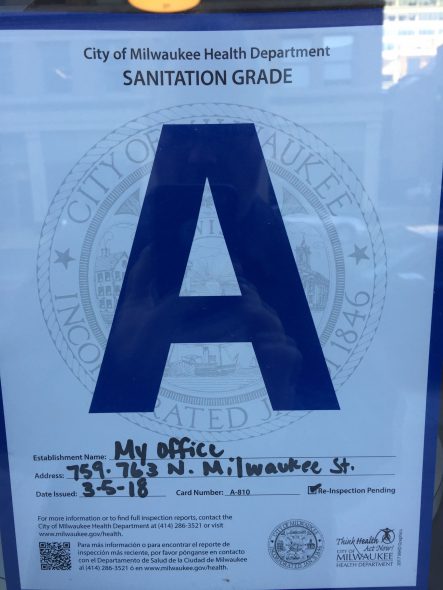State Ruling Threatens City Health?
Killing city’s restaurant rating system could increase food-borne illness in Milwaukee.
It was back in January that the city health department launched a new grading system whereby restaurants would be ranked on their health practices and given grades of A, B or C, with C being less than 60 points on a 100-point scale. Restaurants given a C rating would be closed temporarily if inspectors determined a health threat was present.
This was not a spur-of-the-moment decision, but something the department had worked on for years, in conjunction with the U.S. Food and Drug Administration, which awarded Milwaukee a 5-year, $350,000 grant to develop the program. It was also a response to the fact that the estimated incidence of food-borne illnesses had been rising in the city, from 4,389 incidents in 2013 to 5,184 in 2017 and that risk-factor violations discovered during city restaurant inspections had risen from 24 percent in 2013 to 34 percent in 2017.
Food-borne illnesses like Campylobacter, E. coli 0157, Listeria, Salmonella, Vibrio and Yersinia can be spread by places handling food, including restaurants, and at their worst can have traumatic consequences. “You can die from any of these illnesses,” notes Claire Evers, Director of Consumer Environmental Health for the city Health Department.
As each restaurant’s grade would be available for the public to check, owners had a incentive to make sure they were following the proper standards for storing food, washing hands and the like. And the city immediately saw positive results: The number of violations detected per inspection dropped from 4.2 in 2017 to 3.4 in 2018.
Yet the Wisconsin Board of Agriculture, Trade and Consumer Protection has now stepped in to kill the system. On November 15 its board voted 4-2 to recommend a change in state food rules that would prohibit restaurant grading systems.That recommendation will go to the governor and state Legislature for approval and could go into effect next spring.
“This vote has nothing to do with public health and everything to do with power,” charges Ald. Michael Murphy, who has worked with the Health Department on the new system. “They should probably get rid of the words ‘consumer protection’ from the (state) department’s name.”
Susan Quam, its executive vice-president, says the group is very opposed to the grading system. “We had a lot of calls and emails from restaurants in Milwaukee” who complained, she says.
Murphy says a member of the association told him that restaurants were complaining because “they have to make all these changes.” But that’s exactly the point, the alderman says: to make sure restaurants follow proper health practices.
Murphy notes that the city worked with the association and restaurants at every step of the process of creating the new system and “they made recommendations and asked for changes.”
Restaurants and stores can have training sessions or consult with health inspectors, Evers told the Journal Sentinel. “We never want to have a ‘gotcha’ type of attitude or environment.”
Quam contends there is no evidence that a restaurant grading system has any impact on health. But Evers points to a study of the New York City grading system, where the rate of salmonella decreased by 5.3 percent compared to the rest of the state after the city instituted its restaurant grading system. There is considerable evidence the approach works, Evers notes, which is why some 80 cities in North America now have a restaurant grading system, including Toronto, Los Angeles, Boston, Seattle, Las Vegas, St. Louis and Atlanta. “And some of those systems go back 15 years,” she notes.
Quam contends the FDA doesn’t support such grading systems, but it awarded Milwaukee the grant to create such a program and regularly monitored the city’s progress, Evers notes: “I report to them on an annual basis.”
The city also shared results of its planning with state officials over a period of years, she notes, and heard no objections until after the system was launched. This led to meeting of Evers and Murphy with Dr. Steve Ingham, the Administrator of the Division of Food and Recreational Safety for DATCP.
As Evers recalls it, Ingham said “well, I’ve got Milwaukee in favor of the system and the restaurant association opposing it, so I went to my boss and he said ‘go with the restaurant association.’” Ingham did not respond to Urban Milwaukee’s request for comments, and Ingham’s former boss, Peter Haase, Director of the Bureau of Food and Recreational Businesses for DATCP, is now retired.
Ingham, however, noted that the state is supposed to have a uniform policy for how restaurants are handled and no other city in Wisconsin had such a system.
“We testified at public hearings that there needs to be consistency across the state,” Quam says. “We have members with multiple restaurants in different cities and we can’t have one jurisdiction requiring one thing and another something else.”
The board members who made the ruling in favor of the association’s view cited the same reason, the need for consistency in state rules.
But there is no uniformity in state rules, Evers notes. “The state requires that every restaurant must have a certified food manager, but each local jurisdiction can require they have more than one. Cities can vary in how often they inspect restaurants and the fees they charge.”
This is clearly a gift to a special interest, Murphy charges. “The restaurant association is scared owners are not complying with health rules and they’re going to lose business.”
Murphy has released a letter he is sending to Gov. Scott Walker urging him to overturn the decision by DATCP. He notes the city spent four years developing this program and supplemented the $350,000 federal grant with city funding of $140,000 plus $100,000 in-kind support. “To ban the program now,” he writes, “would be a terrible waste of taxpayer money.”
If you think stories like this are important, become a member of Urban Milwaukee and help support real independent journalism. Plus you get some cool added benefits, all detailed here.
More about the City's Restaurant Grading System
- Campaign Cash: Walker Rewards Restaurant Association? - Wisconsin Democracy Campaign - Dec 13th, 2018
- Murphy’s Law: State Ruling Threatens City Health? - Bruce Murphy - Nov 29th, 2018
- Food grading system decision ignores wishes of Milwaukee consumers, business owners - Ald. Michael Murphy - Nov 29th, 2018
- Businesses and officials: Keep Milwaukee’s popular food grading system - Ald. Michael Murphy - Nov 9th, 2018
Read more about City's Restaurant Grading System here
Political Contributions Tracker
Displaying political contributions between people mentioned in this story. Learn more.
Murphy's Law
-
The Last Paycheck of Don Smiley
 Dec 17th, 2025 by Bruce Murphy
Dec 17th, 2025 by Bruce Murphy
-
Top Health Care Exec Paid $25.7 Million
 Dec 16th, 2025 by Bruce Murphy
Dec 16th, 2025 by Bruce Murphy
-
Milwaukee Mayor’s Power in Decline?
 Dec 10th, 2025 by Bruce Murphy
Dec 10th, 2025 by Bruce Murphy





















